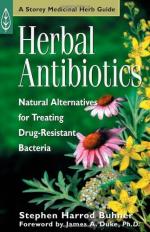|
This section contains 2,024 words (approx. 7 pages at 300 words per page) |

|
Antibiotics are drugs such as penicillin, streptomycin, and erythromycin that are administered orally or by injection to rid the body of harmful bacteria that cause disease. Some microscopic bacteria that enter the human body through an opening or a wound quickly find abundant food and reproduce in great numbers, releasing toxins as they grow or when they die. The toxins can destroy human cells or interfere with cell function, causing diseases like pneumonia or tuberculosis. Antibiotic drugs are derived from natural compounds that are antagonistic or harmful to bacteria. In nature, some organisms such as fungi and certain bacteria have evolved ways of defending themselves against harmful bacteria by producing their own toxins that destroy bacterial cells. Molds, such as those in the Penicillium family or Streptomyces griseus, have become a source of drugs for human use. These anti -(against) biotic (life) compounds usually work by either...
|
This section contains 2,024 words (approx. 7 pages at 300 words per page) |

|


